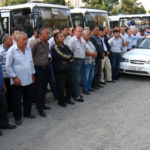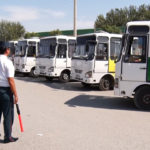The Cover-Up: Whitewashing Uzbekistan’s White Gold
See the full report here: http://harvestreport2015.uzbekgermanforum.org/
The evidence from the 2015 cotton harvest in Uzbekistan indicates that the government has not undertaken reforms to end its systematic use of forced labor. Yet the 2015 cotton harvest in Uzbekistan differed from previous years in a significant way: While the government continued to force more than a million people to pick cotton and farmers to grow cotton under threat of penalty, it did so while making significant efforts to project the appearance of cooperation with the International Labour Organization (ILO) and to claim compliance with its commitments to the World Bank to apply labor laws.
The Uzbek government had a lot at stake. The World Bank has invested more than $500 million USD in Uzbekistan’s agricultural sector. Following a complaint from Uzbek civil society, the Bank attached loan covenants stipulating that the loans could be stopped and subject to repayment if forced or child labor was detected in project areas by monitors from the International Labor Organization, contracted by the World Bank to carry out labor monitoring during the harvest.
Instead of good faith efforts to reform, the government appeared to double down on coercion. The government’s 2015 “re-optimization” plan for agriculture punished farmers in debt or who failed to meet production quotas by taking back their land. Under another plan known as “Cleaver,” the prime minister ordered bailiffs and police to repossess the farmers’ property for debts or unfulfilled production quotas. They confiscated livestock, tractors, even televisions without court orders or valuation processes. As in previous years, the government imposed cotton production quotas on farmers and exerted control over every aspect of production. The government’s procurement price for cotton, set at less than production costs, and system of government-controlled monopolies for agricultural inputs and purchasing, conspired to keep farmers in a cycle of crippling debt.
To harvest cotton, officials once again forced more than a million people, including students, teachers, doctors, nurses, and employees of government agencies and private businesses to the cotton fields, against their will and under threat of penalty, especially losing their jobs. The government forcibly mobilized teachers and medical workers to the fields en masse, despite stated policy commitments not to recruit from these sectors. People picked cotton for shifts of 15-40 days, working long hours and enduring abysmal living conditions, including overcrowding and insufficient access to safe drinking water and hygiene facilities. People with the means could avoid fieldwork by hiring replacement workers to pick cotton in their name or by paying off their supervisors. Officials and business owners, themselves under pressure to support the national plan, ordered 40% or more of their employees to pick cotton, often in written directives. The Uzbek-German for Human Rights obtained several examples, included in an online table of documents[1], that illustrate the state organization of forced labor on a massive scale.
Uzbek citizens subsidized the government’s cotton industry with their labor and incomes. Through extensive field research throughout 2015, we found that cotton work is not viewed by the vast majority of people as an opportunity to supplement incomes. Instead, the forced labor system of cotton production exacted a significant economic toll on many workers, who earned little or failed to earn enough to cover their costs and justify the associated risks and personal and professional disruptions.
The government also undermined education and health care by mobilizing teachers and healthcare workers en masse across the country for long shifts as well as daily cotton work, leaving schools and medical facilities understaffed. Employees who remained at work while their colleagues picked cotton had to work extra for no overtime pay to cover their colleagues’ absences, especially as some institutions such as schools and hospitals experienced tremendous pressure to appear to be functioning normally. Many colleges (the equivalent of high school) and universities suspended classes entirely for students at the harvest, or, in the case of some colleges, nominally held classes only for first- and second-year students while third-year students picked.
A powerful climate of fear pervaded the harvest season and facilitated the government’s forced mobilization of workers. Nearly everyone we spoke with during the season indicated that they were directly threatened or understood implicit threats if they refused to pick cotton, most crucially that they would lose their jobs. The climate of fear prevented people from using a complaint hotline run by the Labor Ministry and state-controlled trade union federation, and from speaking openly to the ILO’s monitoring teams, which were comprised of one international member and five officials from government or government-controlled organizations.
The government unleashed an unprecedented campaign of harassment and persecution against independent monitors to attempt to cover up its use of forced labor while taking pains to make widespread, massive forced mobilization appear voluntary. In some cases, it forced teachers, students, and medical workers to sign statements attesting that they picked cotton of their own will and agreeing to disciplinary measures, including being fired or expelled, if they failed to pick cotton. It instructed people to lie to monitors saying they came to pick cotton of their own volition. Officials also repeatedly arrested, assaulted, and fabricated charges against citizens documenting forced labor, including Uzbek-German Forum’s monitors.
Despite the government’s efforts to cover up forced labor and impede effective monitoring, the ILO concluded that forced labor remains a problem and significant reform efforts are needed. Despite these findings, the Uzbek government continued to receive World Bank funds. As detailed in the final chapter of this report, the Uzbek-German Forum urges the Uzbek government to end the coercion and corruption that pervade its cotton sector and violate the rights of its citizens, and calls on the World Bank, United States, European Union and ILO to hold Tashkent accountable for its international commitments.
See the full report on: http://harvestreport2015.uzbekgermanforum.org/index.php









